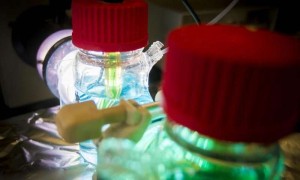
The new solar cell developed by the University of Texas at Arlington team is more efficient and can store solar energy at night.
Image: UT Arlington
A research team from the University of Texas at Arlington comprised of both present and past ECS members has developed a new energy cell for large-scale solar energy storage even when it’s dark.
Solar energy systems that are currently in the market and limited in efficiency levels on cloudy days, and are typically unable to convert energy when the sun goes down.
The team, including ECS student member Chiajen Hsu and two former ECS members, has developed an all-vanadium photoelectrochemical flow cell that allows for energy storage during the night.
“This research has a chance to rewrite how we store and use solar power,” said Fuqiang Liu, past member of ECS and assistant professor in the Materials Science and Engineering Department who led the research team. “As renewable energy becomes more prevalent, the ability to store solar energy and use it as a renewable alternative provides a sustainable solution to the problem of energy shortage. It also can effectively harness the inexhaustible energy from the sun.”
The researchers believe that this development could help change the energy infrastructure and the way we generate and consume energy. With the ability to store energy under dark conditions, the University of Texas at Arlington team looks to take another step forward in a sustainable future.
ICYMI: Listen as respected electrochemical power source researcher, Johna Leddy, talks about the future of the energy infrastructure and how to make the world a better place.
“We have demonstrated simultaneously reversible storage of both solar energy and electrons in the cell,” said Dong Liu, past ECS member and lead author of the paper. “Release of the stored electrons under dark conditions continues solar energy storage, thus allowing for unintermittent storage around the clock.”
PS: Check out Dong Liu and Fuqiang Liu’s past meeting abstract entitled, “An Efficient Solar Energy Storage System: All Vanadium Redox Photoelectrochemical Cell from the 227th ECS Meeting.

